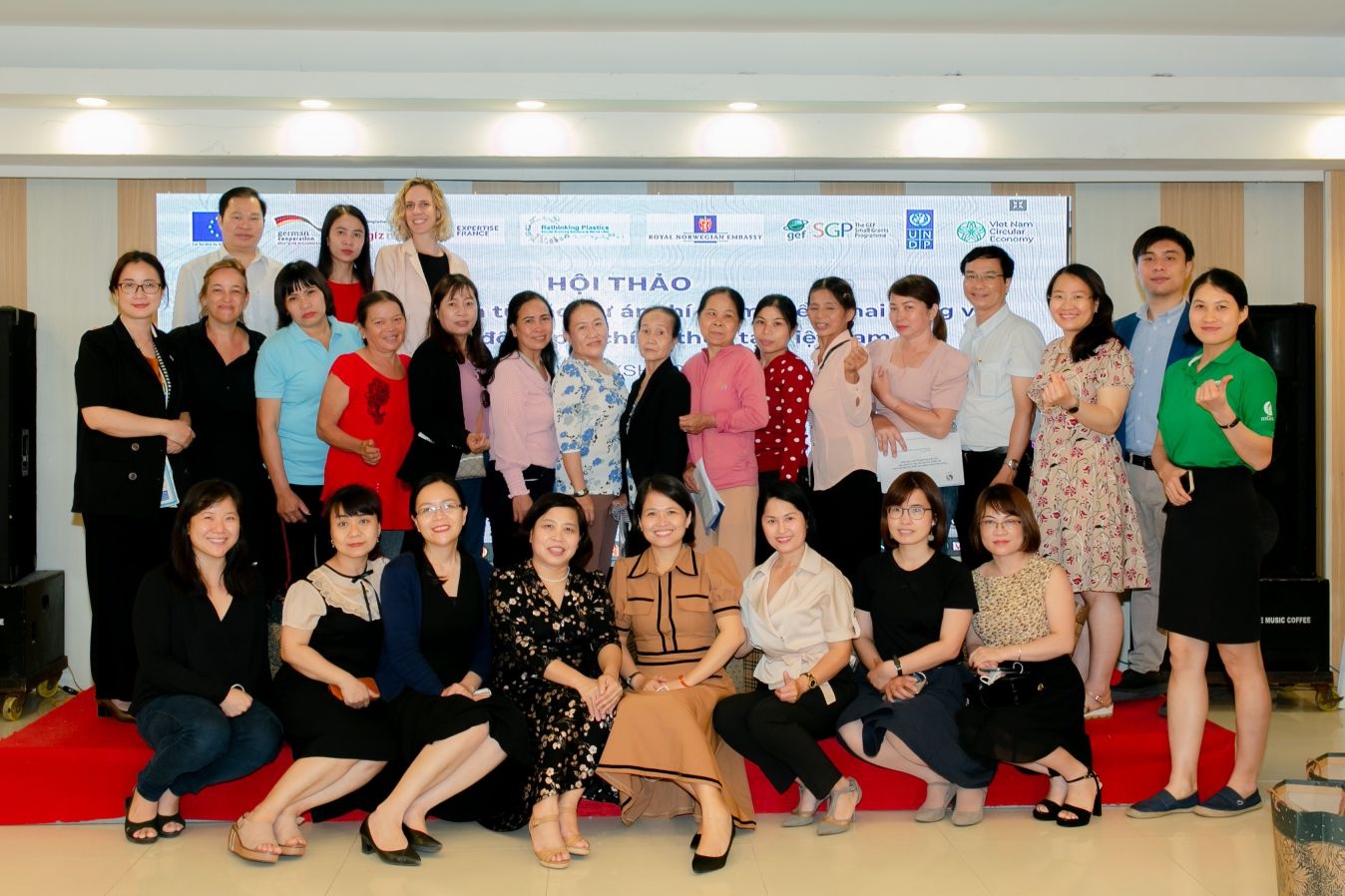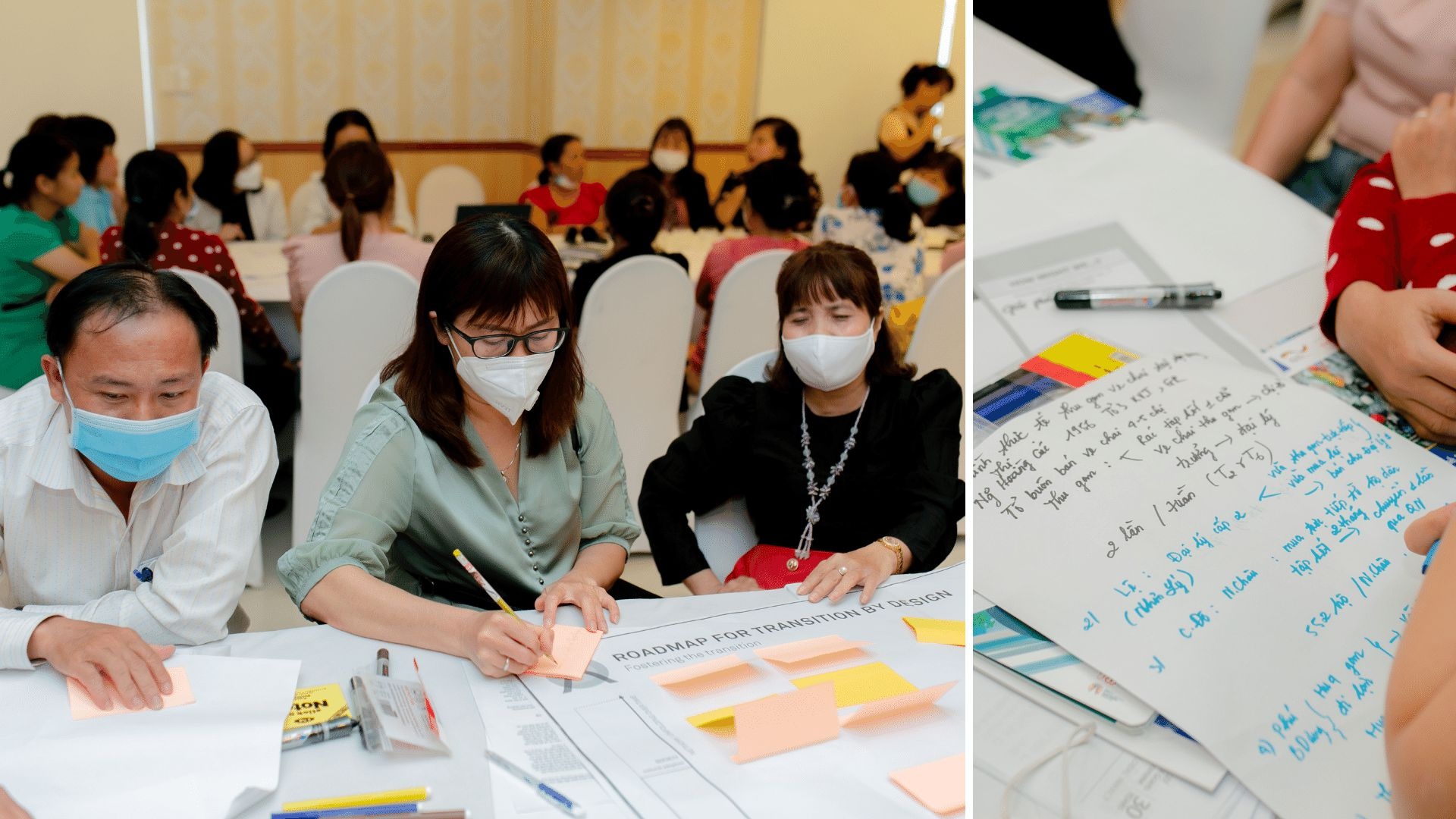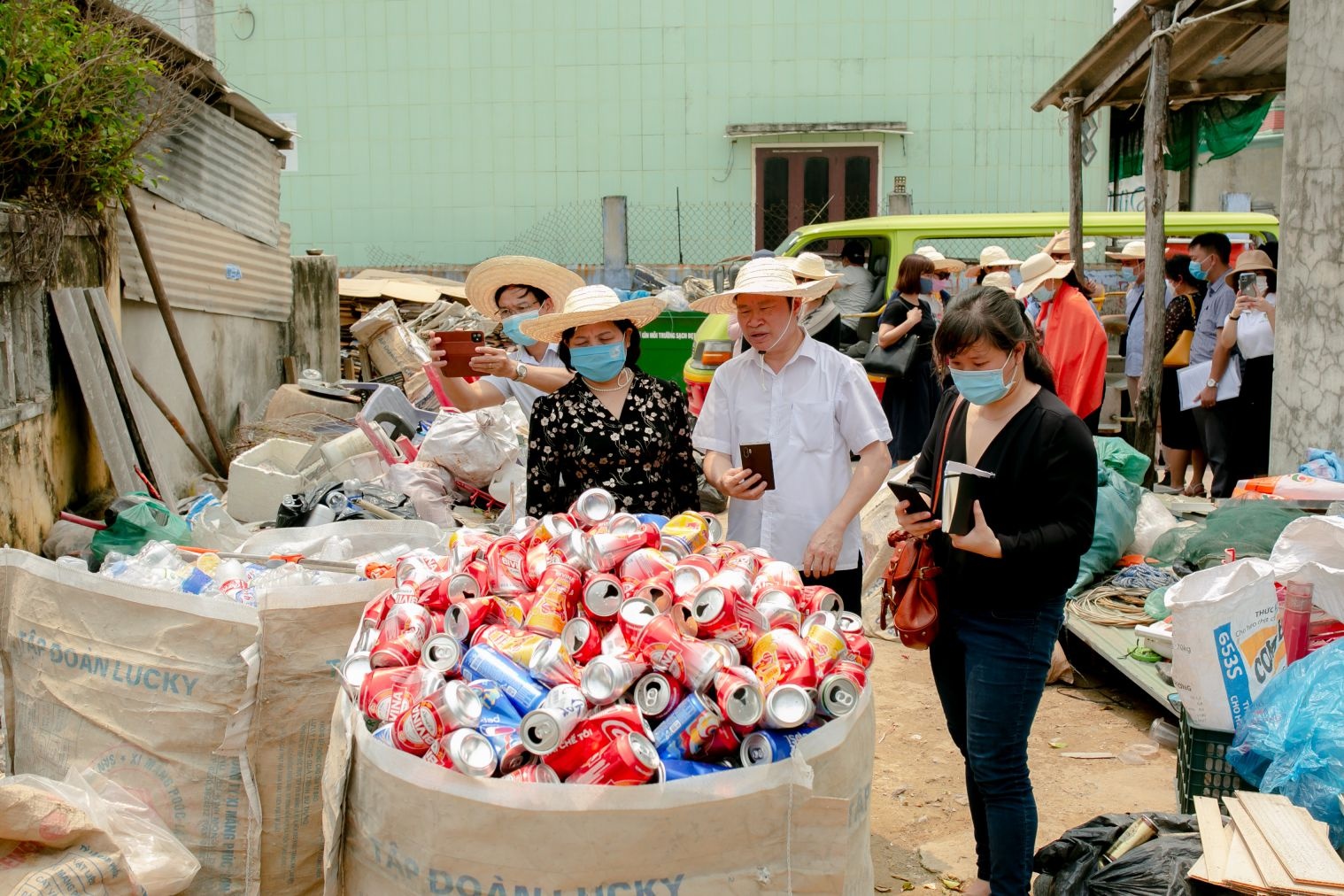Fostering a just and sustainable future for Vietnam’s female waste workers
 |
| The workshop was held in-person in Quy Nhon and as an online conference, with the group work in the second half carried out in both spaces |
On April 14, the EU-BMZ-funded ‘Rethinking Plastics – Circular Economy Solutions to Marine Litter’ project and the UN Development Programme Vietnam co-hosted the workshop Lessons Learned from Pilot Projects Working with Women Informal Waste Workers in Vietnam in Quy Nhon and as an online conference.
The workshop welcomed stakeholders researching and implementing projects in waste management and circular economy, including female informal waste workers from Binh Dinh province, representatives from the local Department of Natural Resources and Environment and government, NGOs, CSOs, development partners and international organisations.
The participants discussed several initiatives and worked to propose recommendations for policies to improve the livelihoods of waste workers and recognise their important role in Vietnam’s transition to a circular economy.
Chair of the conference and the UNDP’s Resident Representative for Vietnam, Caitlin Wiesen, emphasised in her opening remarks, “We are delighted to organise this important event with our partners, the EU-Rethinking Plastics project and the provincial People’s Committee of Binh Dinh.”
Preceding the workshop, the world’s heads of state and environmental ministers endorsed vital resolutions for the introduction of an international legally binding agreement to end plastic pollution as well as enhance the circular economy at the UN Environment Assembly on March 2. As a novum, the roles of informal waste workers have been recognised in a resolution and the intergovernmental committee stated to consider “the lessons and best practices from the informal and cooperative settings.”
Between 10,000 and 16,000 waste workers work every day in Hanoi and Ho Chi Minh City. Known as dong nat, nhom nhua or ve chai, they buy and collect waste from households to resell to recyclers. The majority of them, women, earn less than their male counterparts, and 9 per cent of waste pickers are said to be children.
Nguyen Thai Huyen from the Hanoi University of Architecture explained that waste collectors have been existing for around 200 years in Vietnam, with most of them working rather as waste pickers and collectors.
“These people are not official waste management employees. However, they do provide the input for many of the craft villages around Hanoi and Ho Chi Minh City,” Huyen said.
UNDP’s Wiesen emphasised, “Here in Vietnam, over 60 per cent of the workforce in the informal waste management sector are women. They often work in precarious situations and are exposed to harmful substances and chemicals along the value chain. Disproportionally impacted by plastic pollution, they also have direct exposure to toxic gases and emissions from waste burning and cooking fuels and can suffer from heat-related diseases and skyrocketing air pollution levels.”
 |
| During the second major part of the event, participants analysed relevant problems and suggested a roadmap to improve the situation of informal waste workers in Vietnam's cities |
All-encompassing approaches
Funded by the Norwegian Embassy, UNDP developed and implements integrated and fair models to improve waste management systems, such as the project Scaling Up a Socialised Model of Domestic Waste and Plastic Management (aka the Five Coastal Cities Project) in Quang Ninh, Danang, Binh Dinh, Binh Thuan, and Binh Duong provinces.
The project expects to expand waste picker and collector groups’ businesses and establish favourable conditions to ensure sustainability, tackle local capacities and systematically strengthen waste management, improve citizens’ awareness of waste and plastic, and increase corporate regulations on sustainable production and consumption, among others. The project’s summary can be found and downloaded here.
Along with projects supported by Vietnam’s overseas partners, the government also introduced a series of legal changes in the last few years that aim to establish a circular economy and end plastic pollution. Adopted in November 2020, the revised Law on Environmental Protection builds the institutional basis for developing a circular economy and strengthens the stipulation on solid waste management directives.
One of them, Decree No. 08/2022/ND-CP, was issued on January 10, comprising chapters on waste management, Extended Producer Responsibility (EPR), and strengthened operational regulations on waste management.
EPR may create opportunities and pose challenges for the collectors and aggregators as the informal sector plays a pivotal role in Vietnam’s solid waste management system, with over 30 per cent of the waste collected through this channel.
Rui Ludovino, first counsellor of Climate Action, Environment, Employment, and Social Policies at the Delegation of the EU to Vietnam said, “The traceability of the packaging value chain will impact the current organisation of the waste management and it’s an opportunity to integrate and recognise the collectors as contributors to the circular economy.”
However, Ludovino added, “The integration of waste pickers can be challenging in terms of material and immaterial capacity building and registration […] in order to improve their living conditions.”
Long-term improvement of livelihoods
 |
| Before the conference in the afternoon, the participants conducted field visits in Nhon Ly commune in Quy Nhon city |
Nguyen Thi Anh Hong, vice chair of Quy Nhon Women’s Union, said that the organisation of the project on integrated management of plastic waste in Nhon Ly (Quy Nhon) has effectively promoted the cooperation between the community and social organisations. The model focused on raising awareness and building capacities to improve the collection and recycling and was implemented in four communes and wards, as well as supported 22 female workers with zero-interest loans.
“This model has contributed to limiting a large amount of waste leaked into the environment, about more than 31.3 tons of scraps of all kinds,” Hong said. “In order to implement more models and support female waste workers, it is necessary to have the participation of all sectors to guide and provide professional technical support, thus creating conditions for such projects’ activities to be conducted smoothly.”
Assessing the informal waste collection in Vietnam, Nguyen Thi, representative from the Department of Legal Affairs under the Ministry of Natural Resources and Environment described the working conditions in the system as backward, unprotected, and with rudimentary labour tools. Social welfare and health insurance would not exist for many of them, and there is no organisation that would protect their interests.
“In the next five years, informal waste workers will continue to play an effective part in the waste management system. However, we expect competition in the sector to become more obvious, also with automatic waste collection systems,” Thi anticipated.
Thi also expected, “Informal waste workers will slowly move towards large-scale facilities, and modern recycling organisations will emerge. Thus, they should register for employment with a legal entity and not work alone. This will improve their health and work conditions.”
More information about the event and the introduced and related projects can be found on the website Vietnam Circular Economy.
What the stars mean:
★ Poor ★ ★ Promising ★★★ Good ★★★★ Very good ★★★★★ Exceptional
 Tag:
Tag:
Themes: Empowering Women
- Female influence still to be attained
- Shaping Vietnam's corporate future: female board members show business excellence
- Nestlé Vietnam contributes to elevating the role of women across the supply chain
- Empowering female leaders in tech: insights and aspirations shared at KPMG Tech Innovator 2023
- Brighter Path programme hosts empowerment meeting for ethnic minority girls
Related Contents
Latest News
More News
- Trung Nam-Sideros River consortium wins bid for LNG venture (January 30, 2026 | 11:16)
- Vietnam moves towards market-based fuel management with E10 rollout (January 30, 2026 | 11:10)
- Envision Energy, REE Group partner on 128MW wind projects (January 30, 2026 | 10:58)
- Vingroup consults on carbon credits for electric vehicle charging network (January 28, 2026 | 11:04)
- Bac Ai Pumped Storage Hydropower Plant to enter peak construction phase (January 27, 2026 | 08:00)
- ASEAN could scale up sustainable aviation fuel by 2050 (January 24, 2026 | 10:19)
- 64,000 hectares of sea allocated for offshore wind surveys (January 22, 2026 | 20:23)
- EVN secures financing for Quang Trach II LNG power plant (January 17, 2026 | 15:55)
- PC1 teams up with DENZAI on regional wind projects (January 16, 2026 | 21:18)
- Innovation and ESG practices drive green transition in the digital era (January 16, 2026 | 16:51)






















 Mobile Version
Mobile Version